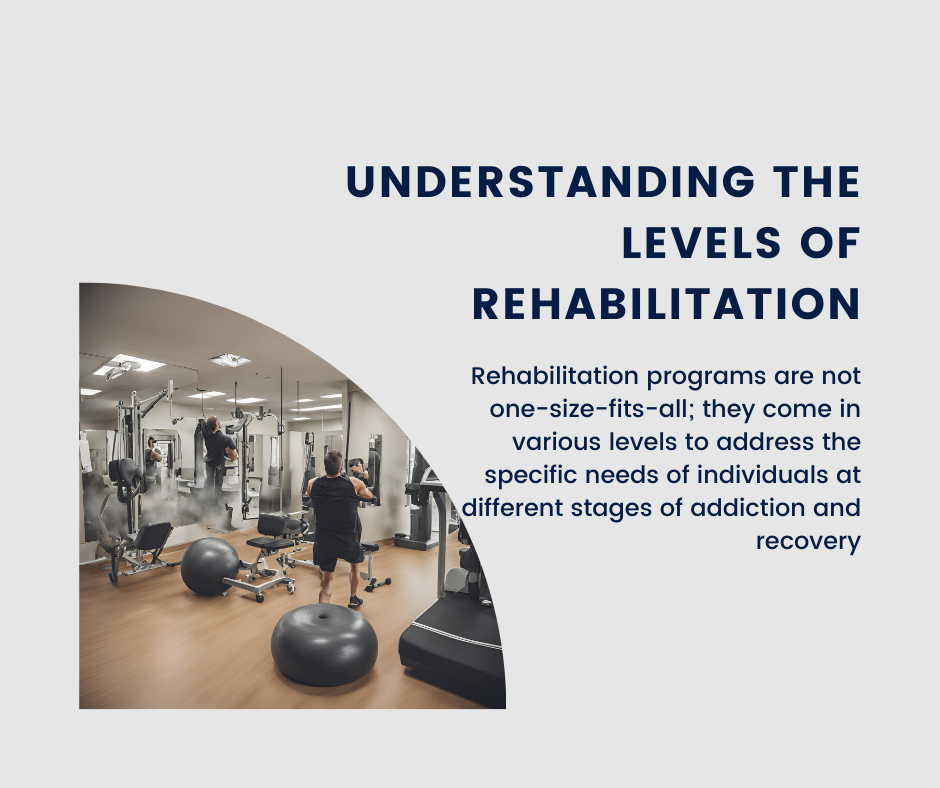Tailored Rehabilitation Programs for Every Level

In the journey to overcome addiction, finding the right rehabilitation program can be crucial to achieving and maintaining recovery. Tailored rehabilitation programs, designed to meet individuals at their specific stage of addiction and recovery, provide a personalized approach that can significantly enhance the chances of success. Understanding the different levels of rehabilitation programs and how they cater to unique needs is essential for anyone seeking or supporting someone in recovery.
Detoxification (Detox): This is often the first step in the rehabilitation process, especially for individuals with severe addiction. Detox programs focus on safely managing withdrawal symptoms as the body rids itself of the addictive substance. Medical supervision is typically provided to ensure the process is safe and as comfortable as possible.
Inpatient Treatment: Inpatient or residential treatment programs require individuals to live at the treatment facility for a specified period. This level of care is intensive and structured, providing a safe and supportive environment free from the triggers and stresses of everyday life. Inpatient programs often include individual and group therapy, medical care, and holistic approaches such as exercise and nutrition counseling.
Outpatient Treatment: Outpatient programs offer flexibility, allowing individuals to continue with their daily responsibilities while attending treatment sessions. This level of care is suitable for those with milder addictions or those who have already completed an inpatient program and need ongoing support. Outpatient treatment typically includes counseling, therapy, and educational sessions.
Aftercare: Aftercare programs are designed to support individuals after they have completed formal treatment. This level of care includes ongoing therapy, support groups, and relapse prevention strategies. Aftercare is crucial for maintaining long-term sobriety and addressing any challenges that arise post-treatment.
The Importance of Tailored Rehabilitation Programs
Tailored rehabilitation programs recognize that addiction is a complex and individual condition. What works for one person may not be effective for another. Personalized treatment plans take into account various factors, including the type and severity of addiction, co-occurring mental health disorders, personal circumstances, and individual preferences.
Personalized Assessments: Effective tailored programs begin with a comprehensive assessment to understand the individual’s specific needs. This assessment helps in creating a customized treatment plan that addresses all aspects of the person’s addiction and recovery journey.
Customized Therapies: Tailored rehabilitation programs offer a range of therapeutic options that can be adjusted to fit the individual’s needs. This may include cognitive-behavioral therapy (CBT), dialectical behavior therapy (DBT), family therapy, and alternative therapies such as art or music therapy.
Holistic Approaches: Recognizing that recovery is not just about abstaining from substance use, tailored programs often incorporate holistic approaches. These can include fitness and nutrition plans, mindfulness and meditation practices, and other activities that promote overall well-being.
Benefits of Tailored Rehabilitation Programs
Tailored rehabilitation programs provide numerous benefits that can enhance the effectiveness of treatment and support long-term recovery:
Increased Engagement: When individuals feel that their unique needs and preferences are being addressed, they are more likely to engage fully in the treatment process.
Better Outcomes: Customized treatment plans that address the whole person – mind, body, and spirit – can lead to more successful outcomes and sustained recovery.
Relapse Prevention: By providing ongoing support and addressing the root causes of addiction, tailored programs can help individuals develop the skills and strategies needed to prevent relapse.
In conclusion, tailored rehabilitation programs are essential for effectively addressing the diverse needs of individuals struggling with addiction. By providing personalized care at every level of the recovery journey, these programs offer a comprehensive and compassionate approach to overcoming addiction and achieving lasting sobriety.